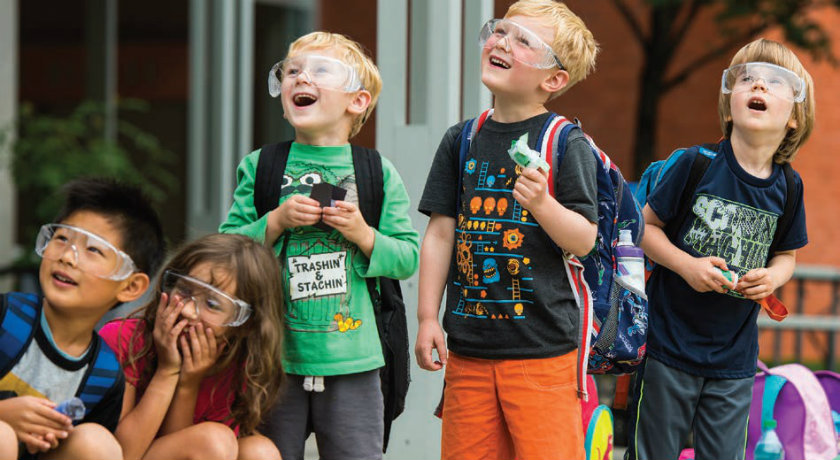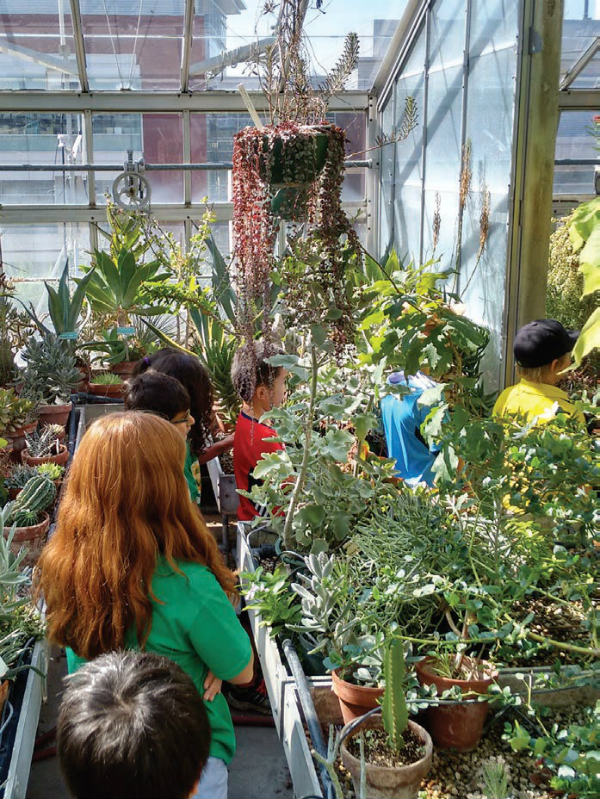
Budding future science business leaders hard at learning work and fun in the Faculty of Science summer camps.
There is no question that our world will be a radically different place a century from now-whether it's the result of climate, politics, rapid advancements in science and technology, or (more likely) a combination of all these.
Fortunately, no group has ever been better equipped for this future than the young people of today. This generation will face a limitless spectrum of career possibilities in which the sky is no longer the limit; they are products of an environment where science has been fully integrated into mainstream culture, one dominated by technology and growing public interest in traditionally esoteric issues like energy production, space exploration, and climate change.
"This generation of students will most likely have jobs and professions that don't exist yet," says Alberta secondary teacher Meredith Easton ('08 BSc [Augustana], '10 BEd). Over the past several years teaching math and science at both the junior high and high school levels, one of the biggest shifts she's seen is in her students' relationship with technology.
Indeed, to the children who grew up using an iPad before they could walk, computers are as ubiquitous and familiar as anything occurring in nature-as is the ability to easily and rapidly access the vast wealth of information available online. Having a near-infinite digital library available at our fingertips is an enormous advantage for human progress.
This shift in society's relationship to technology is compounded by changes to science education. And while science education has traditionally emphasized learning facts (many will recall the various mnemonics taught to remember algebraic formulae or the elements of the periodic table), today's students are more often examining big picture issues that highlight the value of scientific applications and critical thinking.
Science from the ground up
From recreational activities to medical advancements to military applications, it's nearly impossible to escape science in today's modern age. And the more educated people are about science-its strengths and weaknesses-the better off we are as a society.
"Science isn't the answer to everything, but I think we as a society are much better served if everyone at least understands science," says Dean Jonathan Schaeffer.
Easton is inclined to agree. "A love of science is beneficial once our students are out in the world. It helps them in their decision-making process for all kinds of things, from 'what groceries should I buy?' to 'should I vaccinate my kids?'"
Studies have repeatedly shown that the earlier students become interested in science, the more likely they are to pursue scientific careers. As Schaeffer attests, scientific knowledge is most valuable when it is one tool in a larger multidisciplinary kit, but the advantages in creating a science-literate society are clear. "I believe it's really important for people to be exposed to science at an early age and given every opportunity to pursue their interest in science," he says.
This is one reason behind Schaeffer's stalwart support for Faculty of Science engagement activities for families and young people, including a newly expanded summer camp program that expects to welcome upwards of 1250 young people to campus this summer.
More than that, the camps are led by UAlberta students, who will learn a variety of leadership and planning skills over the course of a summer. Camps are offered in a number of themes ranging from computer programming to paleontology to astronomy, requiring student leaders to become adept at applying programming that spans multiple disciplines.
For the students, this is all part of the new undergraduate experience, as expectations of the university experience have moved away from the traditionally strict, single-minded focus on just one area of study in favour of a more diverse educational experience that also covers networking and learning to effectively communicate with others.
"What I see happening is the continuation of an evolution that started years ago but is now accelerating, and it's certainly not going to go away," says Schaeffer. "Science is becoming much more cross-disciplinary, which means it's not just a matter of taking what you learn in a classroom in your discipline and applying it: it's working with people in other disciplines to try and solve problems that are bigger, more ambitious, and perhaps more societally useful."
Take UrbanTundra for example, a group of more than 20 Edmonton high school and first-year university students investigating solutions for the impending problem of how to produce oxygen on Mars. The team, whose philosophy can be summed up in the "20 heads are better than one" maxim displayed on its website, proposed the award-winning idea that a poisonous component of Martian soil could be converted into oxygen using engineered E. coli bacteria at the 2016 International Genetically-Engineered Machines (iGEM) Jamboree in Boston. The team was sponsored by the Faculties of Science, Engineering, and Medicine and Dentistryand represented the first Edmonton team made up of high school students to compete since iGEM's inception in 2005.
Though nominally iGEM is a competition in synthetic biology, it also underlines the importance of learning new skills, being able to work effectively in a team, and sharing knowledge, encouraging teams to consider their projects from multiple angles and extend beyond just the lab work.
The power of perspective
With the breadth of opportunities available, Schaeffer hopes that all science students will take advantage of the chance to embrace collaboration and not limit themselves to one area of study. "The world is becoming multidisciplinary, and the grand problems we want to solve are becoming bigger and more multi-faceted. Learning to live and work in an interdisciplinary environment is pivotal to success."
Students, he suggests, should strive for a well-rounded education that exposes them to multiple perspectives and diverse communities. A science student, for example, could complement her major and pursue a passion by taking a minor in an area like business or the humanities.
"Scientists talk to scientists, but very often when you get out in the real world you have to talk to people with incredibly valuable expertise-and they're not scientists."
"The world is becoming multidisciplinary, and the grand problems we want to solve are becoming bigger and more multi-faceted. Learning to live and work in an interdisciplinary environment is pivotal to success." -Jonathan Schaeffer
For students, getting these interactions with people in varied disciplines is a critical start to building that all-important professional network, and planting the seeds for more ambitious endeavors. "There are lots of things we can teach in the classroom, but getting a student motivated to go off and do something on their own like start a company teaches them a wide variety of skills," says Schaeffer.
An attentive student in the right environment can pick up base skills ranging from organization to finance to legal concerns. "There's so much that you can learn, and these are the kinds of experiences that a classroom can't capture."
One way the Faculty of Science promotes this kind of on-the-job learning is through the Science Internship Program (SIP), which places current UAlberta science students in term positions with industry partners ranging four to 16 months in length.
New computing science grad Chase McCarty ('17 BSc) was drawn to SIP primarily for the boost to his resume, hoping that the internship experience would make him a more competitive applicant when entering the workforce upon graduation. He was offered a programming position with Intuit (home of Canada's best selling financial and tax software), who were so impressed with him that they offered him a permanent position after graduation.
"My eight months at Intuit was by far the best part of my university experience," he reflects. "I got to work on meaningful and challenging problems, I got to meet lots of great mentors whom I'm still in contact with, and I was treated immensely well by my employer during my stay."
The position let him cut his teeth programming in a real business with real stakes, working alongside established programmers and learning on the job. "I got to spend more time coding than the rest of my university degree combined, and it was all with cutting edge technologies and languages," he says. "I really feel like I went from amateur to pro in those eight months."
The old college try
McCarty's SIP placement gave him the opportunity to try the Silicon Valley lifestyle on for size, and it turned out to be a perfect fit-at least, for now.
"I think everyone has a duty to leave the world better with a few less problems than how they found it, and I don't know of any better way to do that than entrepreneurship," he says. "In the long term, that's the path that I see myself taking."
As the value of the entrepreneurial experience becomes more and more recognized, a growing number of resources have become available on campus to support budding business starters like McCarty. Always at the forefront of innovation, the Faculty of Science is taking it even further by establishing a 3600 square foot innovation space on campus for students to try their hand at entrepreneurship.
I think everyone has a duty to leave the world better with a few less problems than how they found it, and I don't know of any better way to do that than entrepreneurship -Chase McCarty
For Schaeffer, the initiator and driving force behind the initiative, "try" is the key word. "Most of the students who try out entrepreneurship and dabble a bit don't end up creating companies, and they don't end up making a million dollars. But they've tried something," he says. "They've learned something new and they have a better appreciation for what it takes to start a company-what it takes to turn an idea into a product or a service, what it might take to go on and earn a million dollars."
Ultimately, it's just another skill students can add to their toolkit when they go out to make their mark on the world.
"We are producing people who are going to change our community, our province, our country, and the world. We have evidence we've already done it, and we will continue to do it."
